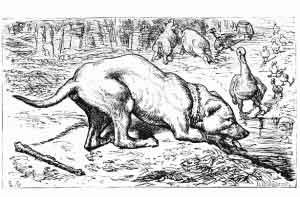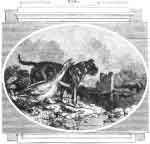A Goose claimed a pond for she and her young and chased all comers. A Mastiff appeared to take a drink and chastised the Goose and got his drink.
Use care with bothering those bigger and stronger than you.

JBR Collection
A Goose once upon a time fed its young by a pond-side, and a Goose in such circumstances is always extremely proud and excessively punctilious. If any other animal, without the least design to offend, happened to pass that way, the Goose immediately flew at it. The pond, she said, was hers, and she would maintain her right to it, and support her honour, while she had a bill to hiss, or a wing to flutter. In this manner she drove away ducks, pigs, chickens, nay, even the insidious cat was seen to scamper. A longing Mastiff, however, happened to pass by, and thought it no harm if he should lap a little of the water, as he was thirsty. The guardian Goose flew at him like a Fury, pecked at him with her beak, and slapped him with her feathers. T he Mastiff grew angry, and had twenty times a mind to give her a sly snap; but suppressing his indignation, because his master was nigh, “A plague take thee,” cries he, “for a fool! Sure, those who have neither strength nor weapons to fight at least should be civil.” So saying, he went forward to the pond, quenched his thirst in spite of the Goose, and followed his master.

Northcote
[Note: The Northcote fable is the same fable as in the JBR Collection above. Only the illustration and Application associated with the fable in the Northcote book are displayed here.]
Application
The resentment of a poor man is like the efforts of a little insect to sting; it may get him crushed, but cannot defend him. Who values that anger which is consumed only in empty menaces? There are no obstructions more fatal to fortune than pride and resentment. If you must resent injuries at all, at least suppress your indignation till you become rich, and then shew your spirit.

